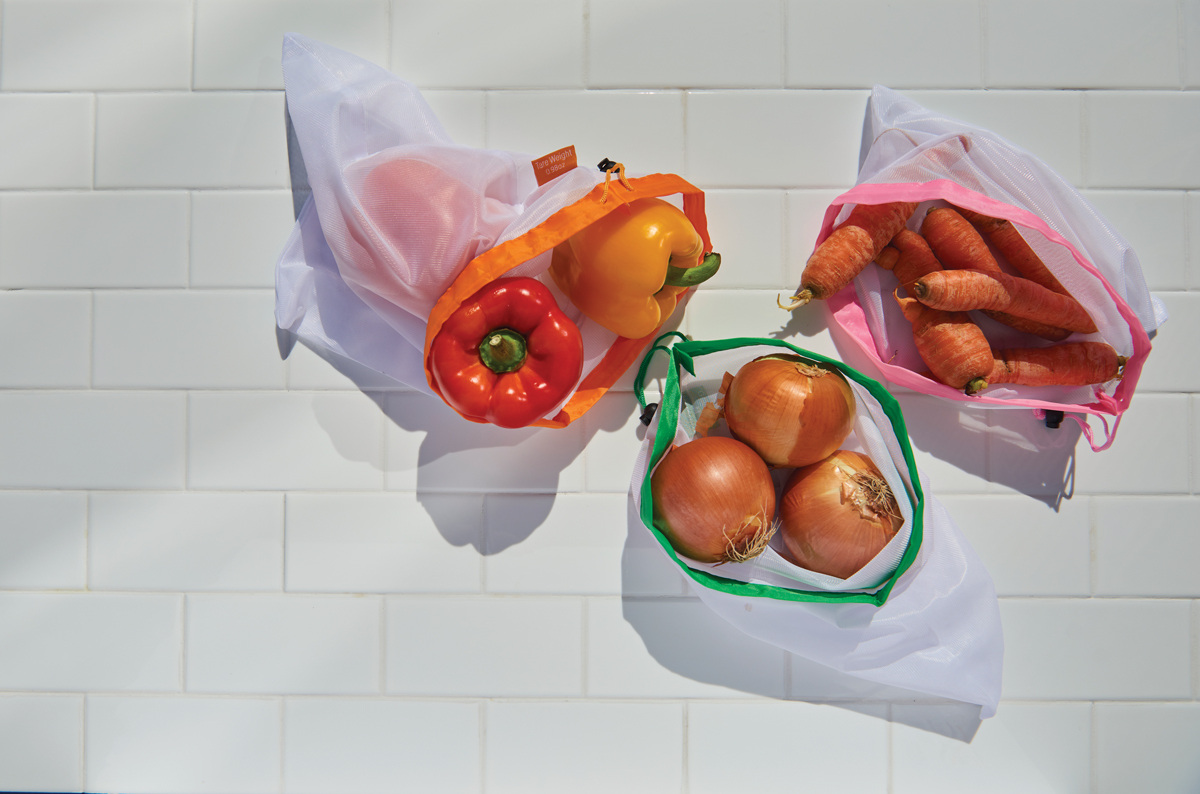
Gogooda reusable mesh bags are the perfect replacements for single-use plastic bags in the produce section. Machine washable, they come in an assortment of sizes to store and rinse food right in the bag.
Buying local in Lancaster County is relatively easy. It doesn’t take any more work, save for carrying small bills for a farmstand on the honor system or going to a farmer’s market on a particular day of the week. We expect our farmers and grocery stores to care about the quality of our food and their environmental impact. Yet, seldom does the question turn back on us – as consumers – as to what impact we are having.
Like many of you, I love the beautiful place we call home. I, too, am enthralled with “hunting and gathering” food and drink from throughout Lancaster County for my dinner table. We are definitely blessed to live in a place that offers a robust Rolodex of roadside stands, orchards, bakeries, butcher shops, ethnic markets, CSAs, specialty gourmet shops, dairies, breweries, distilleries, farmer’s markets and grocery stores.
As my appreciation for Lancaster has grown over the years, I feel a deepening responsibility to treat it with respect. While I can advocate for preserving large swaths of farmland or developing underutilized land, those issues are much bigger than I can tackle in my everyday routines.
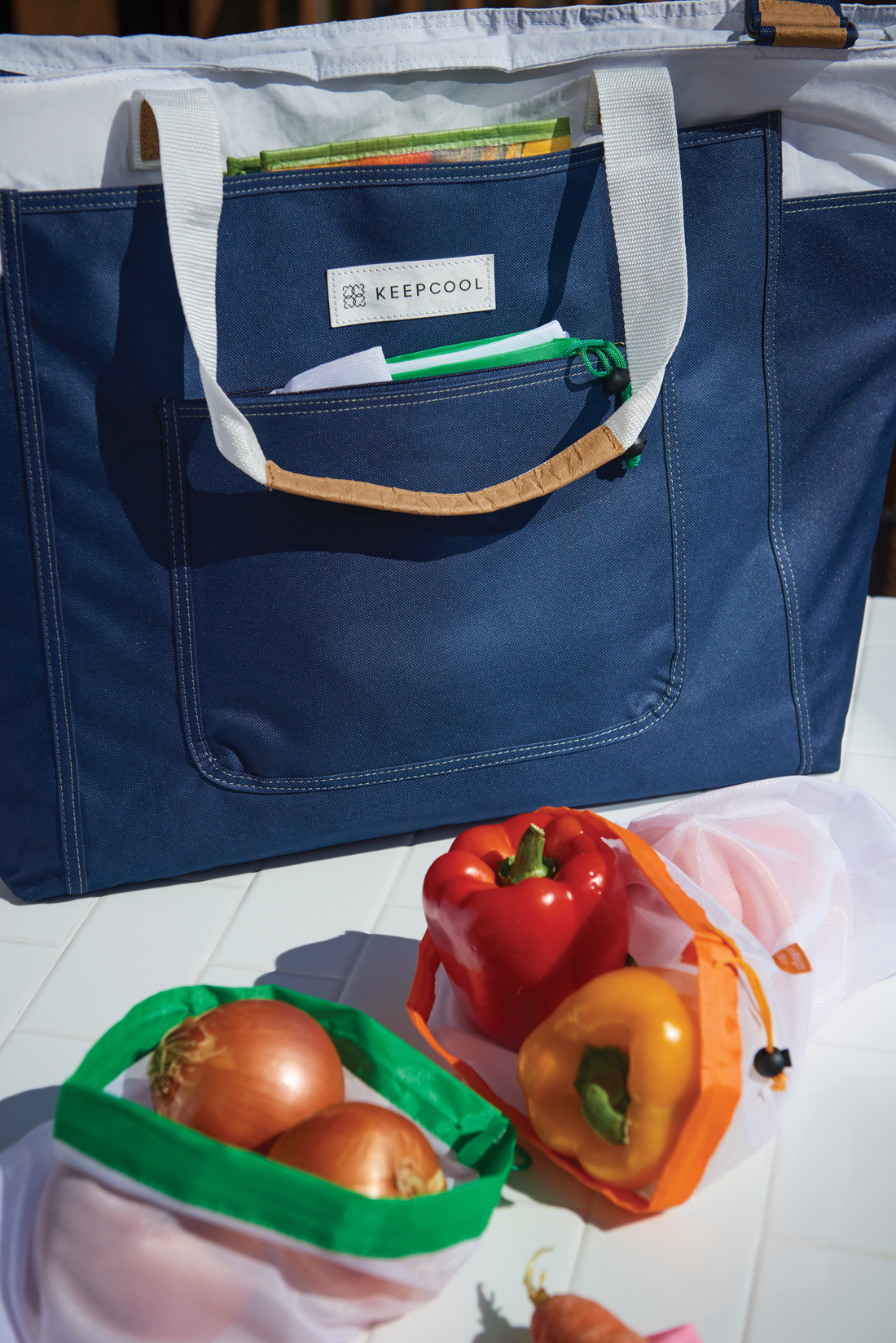
Keep Cool’s insulated Classic Shopping Cooler bag is my go-to reusable bag. The sling is easy to wear and makes navigating through crowded markets easy. Because it keeps food cool for prolonged periods, I can run other errands on my way home.
However, one area where I can make a contribution is my consumption. I’ve endeavored to make a few small changes that I feel cannot only add up to improve our little corner of the world but from a personal perspective, prove to be more convenient.
Because we are creatures of habit, routines are easy to accept without questioning. A friend remarked recently that every day, for years, he drank a can of soda with lunch. Eventually, he asked, “Why am I doing this? This isn’t good for me.” The same question applies to single-use plastic bags, which are proving to be bad for the planet.
It seems frivolous to use something once, for a short walk to and from my car, and then discard it forever. At best, it may have a second life as a trash bag. I know that pet owners “recycle” the bags but I wonder if they are aware that smaller, compostable bags for pet waste can be purchased for a few cents each at a pet store.
Stauffers Aims to Shed Plastic
Last September, I was buying groceries at Stauffers of Kissel Hill in Lititz. The store was quite busy. At the end of the checkout line, I encountered John Welch, the store manager, who was bagging groceries and talking with customers. When I completed my transaction, I was given a reusable grocery bag. Sensing my confusion, John explained that throughout September, Stauffers was giving away reusable grocery bags – made in part with recycled water bottles – with each visit.
The ploy was purposeful – Stauffers was aiming to slowly phase out single-use plastic bags, with the goal being to complete their mission by April 22 – Earth Day – 2020. My curiosity piqued, John pointed me to COO Eric Stauffer, who could supply more information.
According to Eric, Stauffers was previously distributing 4.6-million single-use plastic grocery bags a year. Over 10 years, he points out, that’s 46-million bags largely headed for a landfill, an incinerator or worse. Considering all the grocery and retails stores that exist in Lancaster County alone, one can only imagine how many plastic bags are flooding America’s landfills.
Like many stores, Stauffers does offer collection drop offs for recycling single-use plastic bags – from any source. They collect nearly two tractor-trailer loads annually that are sent to Trex, which uses the bags to manufacture composite decking.
Stauffers is aiming to join stores such as Aldi, Whole Foods and Costco, which have long operated without plastic grocery bags.
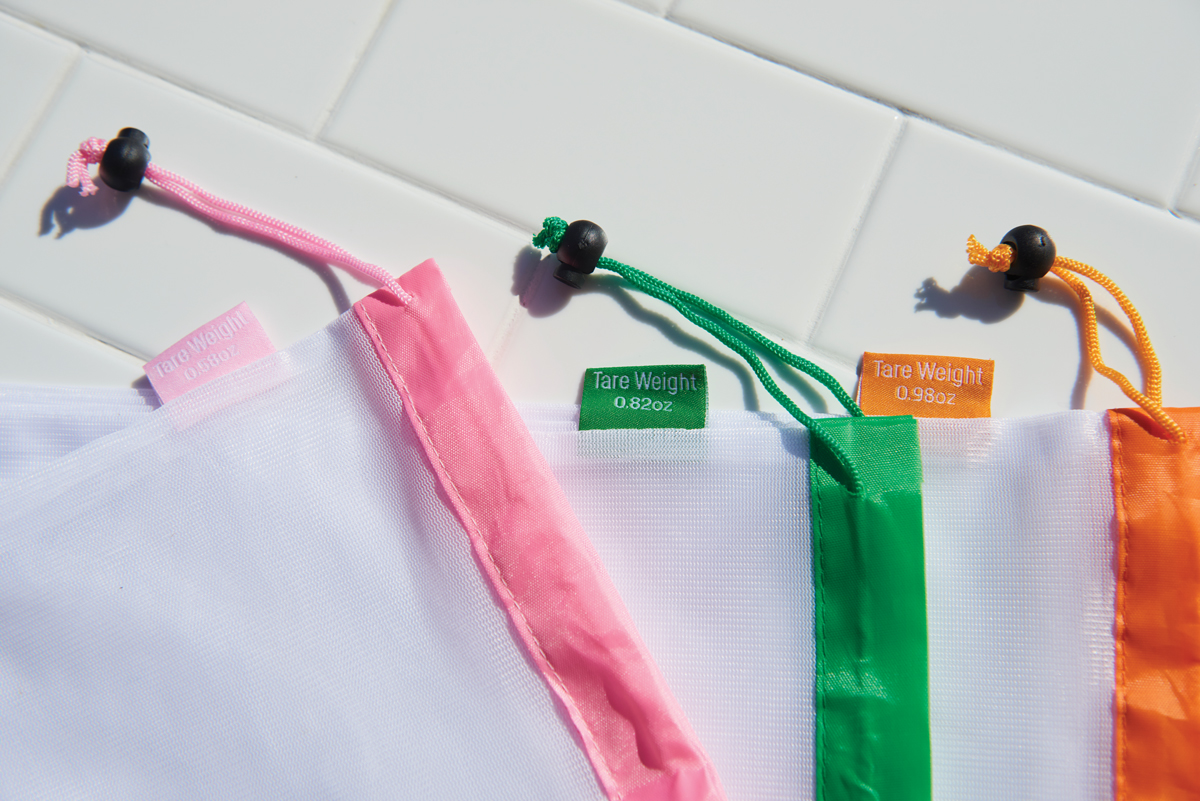
Tare weight is labeled at the drawstring of mesh bags should weight be a concern when paying by the pound.
Since last fall, Stauffers has reduced their reliance on single-use bags by 50% and is continuing to support customers in making the switch towards a 100% reduction. The cost savings have been reinvested into offering low-cost, reusable bags to customers, lowering the price from $1.49 to 99 cents.
Seeing local grocers such as Stauffers making positive environmental changes and revisiting their values – on both the consumer and distribution side of their operations – is encouraging. While it’s plainly an environmental issue, eliminating singe-use plastic bags does affect the bottom line by saving on manufacturing costs and repeated shipping expenses, plus solves the question of what to do with the bags after you unpack your purchases.
The Reusable Bag Route
For the impact to be meaningful, try to get as much life out of a reusable bag as possible. Between local farmer’s markets, CSA pickups and trips to grocery stores, I use mine at least 50 times a year.
But here’s the part that had me switching long ago: my reusable canvas bag is more comfortable to use with a sling, packs at least two single-use plastic bags worth of groceries and will never tear. No more paper or plastic bags ripping on the way to or from the car, eggs rejoice! It closes with a zipper, so groceries aren’t rolling around in the back of the car getting bruised. Certainly, the insulation helps to maintain a better temperature, and I feel more comfortable making extra stops along the way home with cold groceries in tow.
With that said, the trick is bringing the bags along. Because I’m always stopping somewhere for something, my collection of reusable bags simply lives in my car.
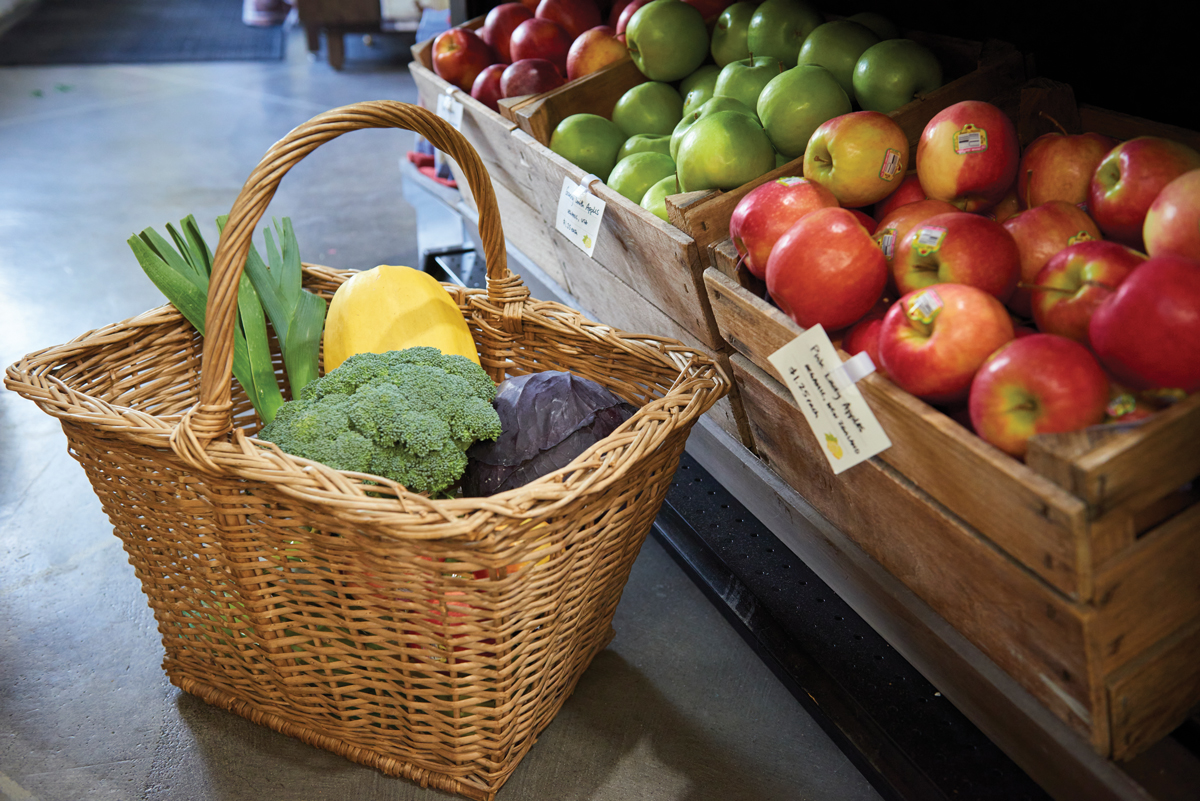
A throwback to market days of yesteryear, wicker baskets are easy to carry, functional and transform into heirloom pieces. (This market basket belonged to editor Sue Long’s grandmother.) I used it to shop at Lemon Street Market in downtown Lancaster, a local leader in environmentally friendly grocery shopping.
Before Green Was In
Long before being green was a popular idea, every woman in Lancaster County probably had a market basket. Finding a vendor at market who supplied bags was next to impossible, making the baskets indispensable.
My grandmother still uses her basket, a utility item that has seen probably a million miles of use by now. To this day, when my grandma shows up with that basket, it still invokes a Pavlovian response tied to baked goods procured from somewhere wonderful, if not something homemade.
Speak Up
Somewhere around 25 years ago, when I was 8 or 9 years old, my family would eat at the since-closed Country Pride Restaurant in Denver. At the time, they used styrofoam cups to serve cold drinks.
It just so happened that in my science class, we had recently learned how different materials break down (or not) over time. On a little comment card, I suggested they switch to an environmentally friendly and biodegradable option: paper cups.
I couldn’t believe it when a month or so later, we returned and they no longer had styrofoam cups. In my small world full of treehouses and jumping bikes off of dirt piles, this was astounding.
The point is, even a child can make a difference, and if you see something that could be improved, you never know what might come about by speaking up.
Mesh Produce Bags
After switching over to reusable bags, I noticed an obvious inconsistency. When buying produce, we’re often presented with delicious, fresh, local, possibly chemical-free or certified-organic food, and end up wrapping it in a single-use plastic bag.
If the goal is to ditch plastic bags, why do these exist for the 10 minutes we’ll use them? (Granted, for transporting raw meat, a plastic bag is still the safest option to prevent cross-contamination.)
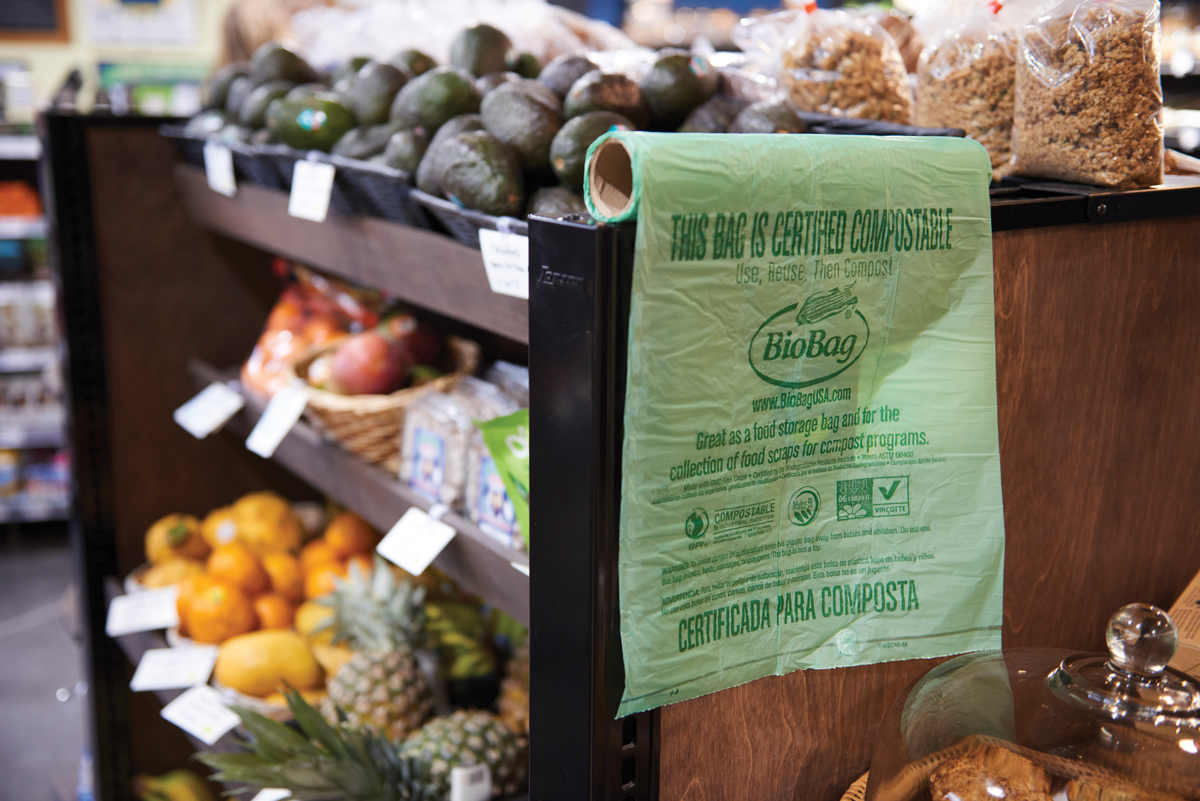
Compostable produce bags are an environmentally friendly inclusion every grocery store could reasonably adopt. I saw these at Lemon Street Market.
I’ve recently discovered there are compostable alternatives. Instagram’s advertising algorithms know me well and presented an ad for reusable mesh drawstring bags of various sizes. For the first time that I can recollect, I followed the ad through and ordered a set with three sizes, which provided enough for us to share as a household.
I also discovered the mesh bags are easier to use versus fighting static-laden plastic bags that seem to be sealed on both ends. It’s easier to identify the food stored in each bag when in the fridge, plus produce can be rinsed directly in the mesh bag, which is air-dried or thrown in the washing machine before being returned to my car.
A common objection is that mesh bags weigh up to an ounce, a consideration when purchasing produce by the pound, not by quantity. The bags are labeled with a tare weight, but getting the clerk to take the time to use them can also be a chore. As time goes on, I would imagine more clerks will get used to seeing them but if you are justly concerned about overpaying, remove produce from the bags while waiting in line and rinse at home.
Be Aware
If you shop at farmstands, you’re probably aware that bags are not always readily available, particularly at the self-serve locations. This is where reusable or mesh bags come in handy. Besides, I’m wary of using containers and bags that have obviously been recycled. That’s great for egg cartons but I won’t use repurposed plastic bags that might have once carried raw meat to transport fruit or veggies home.





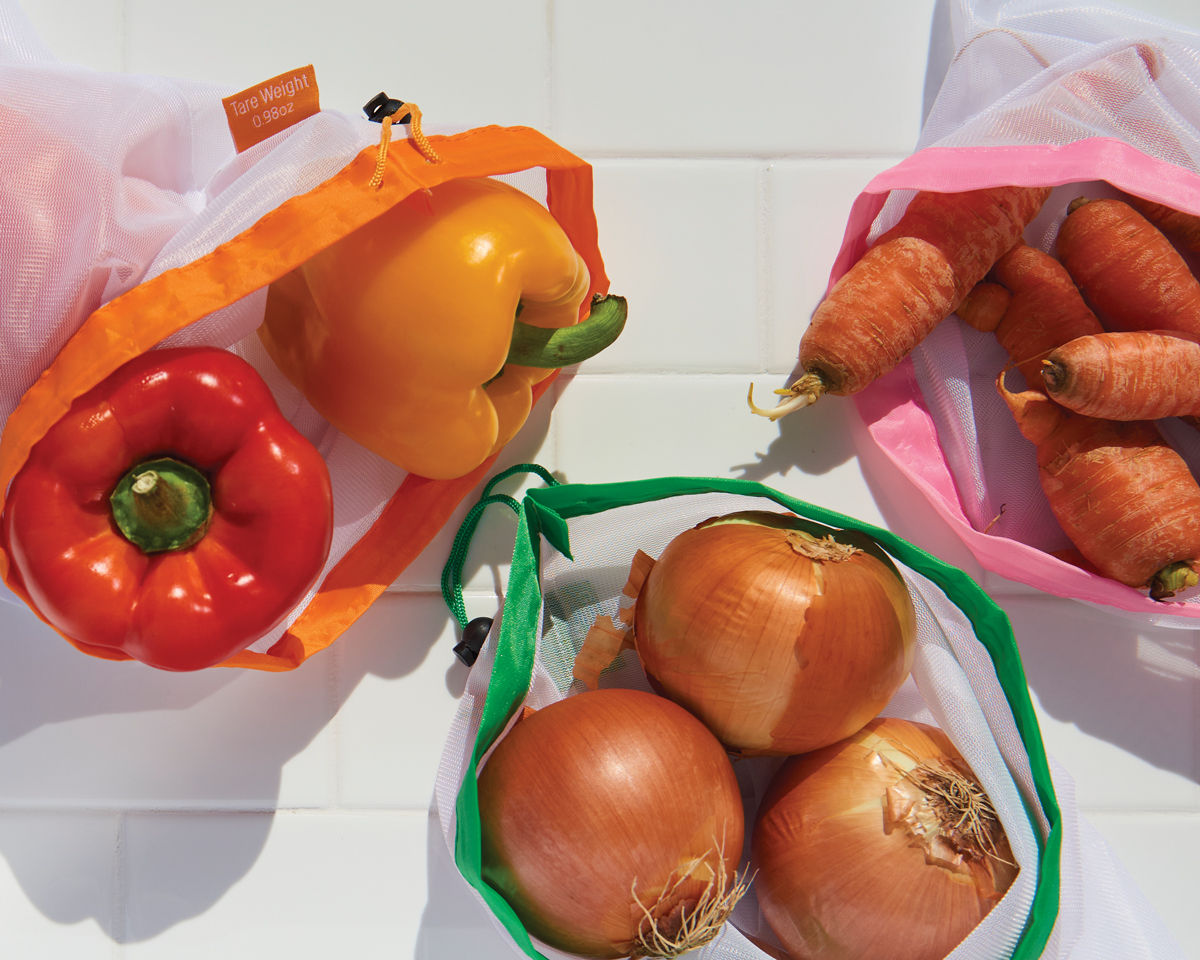
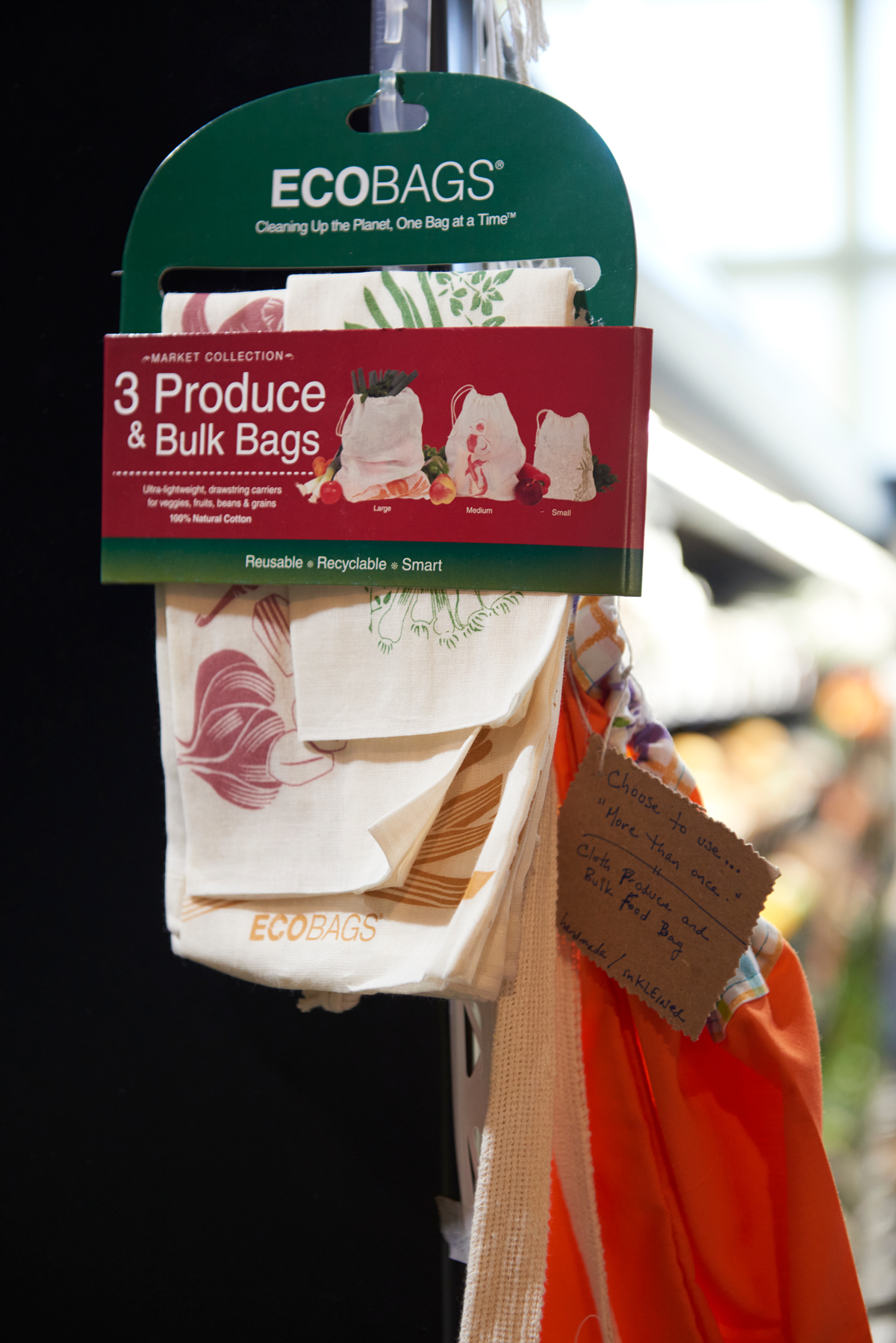
SHARE
PRINT